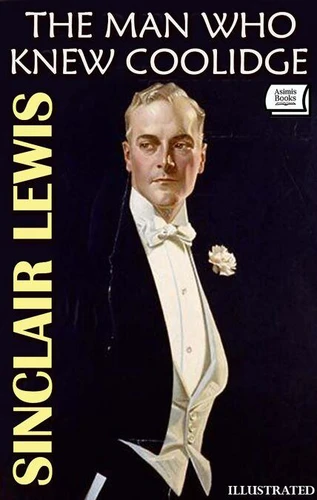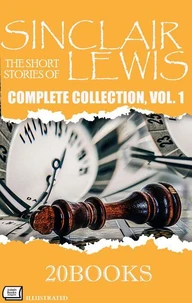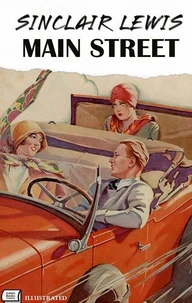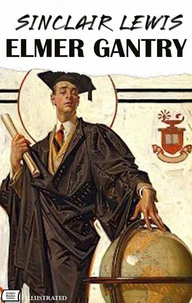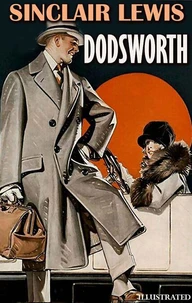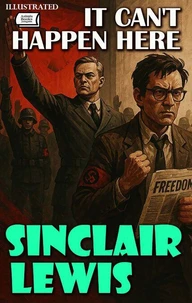Prix Nobel de Littérature
The Man Who Knew Coolidge. Illustrated
Par :Formats :
Disponible dans votre compte client Decitre ou Furet du Nord dès validation de votre commande. Le format ePub est :
- Compatible avec une lecture sur My Vivlio (smartphone, tablette, ordinateur)
- Compatible avec une lecture sur liseuses Vivlio
- Pour les liseuses autres que Vivlio, vous devez utiliser le logiciel Adobe Digital Edition. Non compatible avec la lecture sur les liseuses Kindle, Remarkable et Sony
 , qui est-ce ?
, qui est-ce ?Notre partenaire de plateforme de lecture numérique où vous retrouverez l'ensemble de vos ebooks gratuitement
Pour en savoir plus sur nos ebooks, consultez notre aide en ligne ici
- Nombre de pages154
- FormatePub
- ISBN978-617-8625-74-0
- EAN9786178625740
- Date de parution28/07/2025
- Protection num.pas de protection
- Taille881 Ko
- Infos supplémentairesepub
- ÉditeurAsimis Books
Résumé
Sinclair Lewis's The Man Who Knew Coolidge (1928) is a sharp, satirical novel that departs from his more traditional narratives and presents a monologue-style comedy filled with irony, delusion, and subtle critique of American middle-class values in the 1920s. Told entirely through the rambling voice of Lowell Schmaltz, a traveling salesman who believes himself to be both insightful and important, the novel unfolds as a one-man performance that is both humorous and unsettling.
Schmaltz claims to have once met President Calvin Coolidge, a supposed brush with greatness that becomes the basis for a series of exaggerated anecdotes and moralizing reflections on business, politics, marriage, and ambition.
His monologues, layered with contradictions and self-deceptions, offer a biting portrait of the American everyman-earnest yet oblivious, proud yet insecure. What makes the novel especially unique is its structure: six extended monologues, delivered in a conversational tone, as if the reader were seated across from Schmaltz in a train compartment or hotel lobby. Through this device, Lewis cleverly dissects the culture of boosterism, self-promotion, and the hollow pursuit of the American Dream. Far from being merely comic, The Man Who Knew Coolidge is a study in character psychology and national identity.
Lewis, the first American to win the Nobel Prize in Literature, once again proves his talent for portraying flawed yet deeply human characters with critical wit. This lesser-known novel remains a fascinating and underrated example of 20th-century American satire.
His monologues, layered with contradictions and self-deceptions, offer a biting portrait of the American everyman-earnest yet oblivious, proud yet insecure. What makes the novel especially unique is its structure: six extended monologues, delivered in a conversational tone, as if the reader were seated across from Schmaltz in a train compartment or hotel lobby. Through this device, Lewis cleverly dissects the culture of boosterism, self-promotion, and the hollow pursuit of the American Dream. Far from being merely comic, The Man Who Knew Coolidge is a study in character psychology and national identity.
Lewis, the first American to win the Nobel Prize in Literature, once again proves his talent for portraying flawed yet deeply human characters with critical wit. This lesser-known novel remains a fascinating and underrated example of 20th-century American satire.
Sinclair Lewis's The Man Who Knew Coolidge (1928) is a sharp, satirical novel that departs from his more traditional narratives and presents a monologue-style comedy filled with irony, delusion, and subtle critique of American middle-class values in the 1920s. Told entirely through the rambling voice of Lowell Schmaltz, a traveling salesman who believes himself to be both insightful and important, the novel unfolds as a one-man performance that is both humorous and unsettling.
Schmaltz claims to have once met President Calvin Coolidge, a supposed brush with greatness that becomes the basis for a series of exaggerated anecdotes and moralizing reflections on business, politics, marriage, and ambition.
His monologues, layered with contradictions and self-deceptions, offer a biting portrait of the American everyman-earnest yet oblivious, proud yet insecure. What makes the novel especially unique is its structure: six extended monologues, delivered in a conversational tone, as if the reader were seated across from Schmaltz in a train compartment or hotel lobby. Through this device, Lewis cleverly dissects the culture of boosterism, self-promotion, and the hollow pursuit of the American Dream. Far from being merely comic, The Man Who Knew Coolidge is a study in character psychology and national identity.
Lewis, the first American to win the Nobel Prize in Literature, once again proves his talent for portraying flawed yet deeply human characters with critical wit. This lesser-known novel remains a fascinating and underrated example of 20th-century American satire.
His monologues, layered with contradictions and self-deceptions, offer a biting portrait of the American everyman-earnest yet oblivious, proud yet insecure. What makes the novel especially unique is its structure: six extended monologues, delivered in a conversational tone, as if the reader were seated across from Schmaltz in a train compartment or hotel lobby. Through this device, Lewis cleverly dissects the culture of boosterism, self-promotion, and the hollow pursuit of the American Dream. Far from being merely comic, The Man Who Knew Coolidge is a study in character psychology and national identity.
Lewis, the first American to win the Nobel Prize in Literature, once again proves his talent for portraying flawed yet deeply human characters with critical wit. This lesser-known novel remains a fascinating and underrated example of 20th-century American satire.

